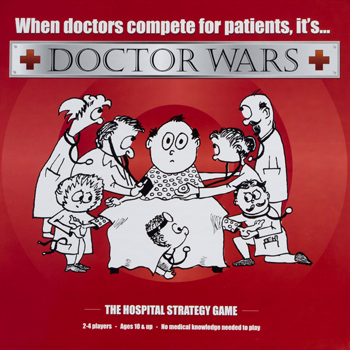By Adam Gerchick ’13
[Games] Some people wake up with memories of dreams. Dr. James Fulmer ’76 woke up with plans for a board game.

“It was sort of a ‘eureka’ type of thing,” he says.
That eureka moment was the conception of Doctor Wars, in which players compete as medical professionals.
More than a decade later, Fulmer has released the game, which draws on his 12 years as a hospitalist and reflects the nature of hospital care in a competition-inspiring way.
“It’s a strategy game,” says Fulmer, who is site director of Baptist Medical Center’s primary care hospital team in Jacksonville, Fla., and medical director of Jacksonville’s River City Clinical Research Center. “You don’t have to know anything about medicine.”
The game’s premise is simple: Each player assumes a team of hospital employees—attending physician, resident, intern and nurse—and competes to treat and discharge patients, collecting points in return. The sicker the patient, the more points the cure is worth.
But Doctor Wars is more than a contest; it’s a lighthearted send-up of the hospital system. To wit: characters are ranked, high to low, from attending physician to nurse, a blunt reflection of the hierarchy in an actual hospital.
As they move among the board’s six units—cardiac, GI, medical, neurology, pulmonary and surgery—higher-ranked characters try to “steal” a subordinate’s patient, collecting that patient’s points.
At the same time, lower-ranked players can move more quickly across the board, evading the boss and racking up patients. The nurse has the special ability to block residents and interns from even getting to a patient. “It’s kind of an inside joke in medical circles,” Fulmer says.
Inanities specific to the medical profession are also represented in the game. For example, a player can dispense cards such as “Can’t Read Doc’s Handwriting,” which costs an opponent five points.
But to Fulmer, the game is not simply an inside joke—and it’s definitely not a substitute for medical school. Instead, it’s entertainment: “I didn’t do it for education purposes. A 10-year-old could win this game.”
As he refined the rules, Fulmer convinced various demographics to test the game. “I played it with people in the hospital: social workers, nutritionists, colleagues,” he says. He also played with elderly patients, as well as with young relatives.

Fulmer began selling Doctor Wars in 2011. When his wife, Susan Gallo, retired last fall, she began to focus her energies on sales and distribution of the game. “It’s become a small business,” Fulmer says.
This spring Doctor Wars had its first big break when a major distributor agreed to market the game in medical bookstores nationwide.
Gerchick graduated from Amherst with a degree in American studies.